Europium(III) acetylacetonate
Europium acetylacetonate (hydrated) can be prepared without much side products from an Europium(III) salt and acetylacetone in presence of base.
MATERIALS REQUIRED:
Europium(III) Chloride 6-hydrate
Acetylacetone
Anhydrous sodium acetate (also hydrate works well adjusting quantities)
Sodium hydroxide
Ethanol 95%
PROCEDURE:
3g of Europium(III) Chloride 6-hydrate are dissolved in about 20 ml of distilled water inside a 100ml round bottom flask. The pH is adjusted to about
7-8 with few drops of diluted NaOH solution.
The solution turns cloudy, due to the presence of europium(III) hydroxide that will dissolve later.
Another solution of 2,5ml of acetylacetone in 10ml of 95% ethanol is prepared and added to the europium(III) solution.
The solution immediately turns light yellow and the europium(III) hydroxide completely dissolves.
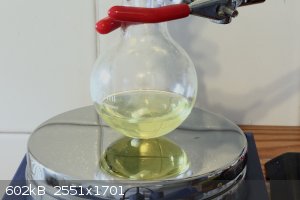
The solution is heated while stirring for about 20min.
Then a dropping funnel is attached at the top of the flask, containing a solution of 2,5g of anhydrous sodium acetate in distilled water with a couple
of drops of NaOH solution.
Sodium acetate solution is added to the reaction misture of the course of 10miin, after that the solution is heated on reflux and stirred for about
30min.
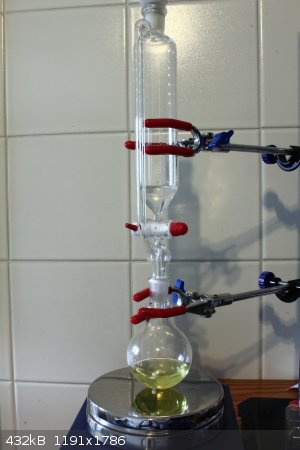
The solution is left to cool and an abundant light yellow precipitate forms. The solution is cooled in an ice bath to allow more of the product to
precipitate and is filtered on Buchner.
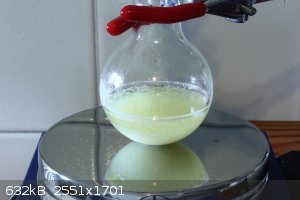
The product is light yellow and quite impure and is recrystallized from a mixture of 20ml 95% Ethanol and 10ml distilled water.
The product consiste of a very fine white crystalline powder.
The yeld is pretty low, about 0,3g.
This product shows a very pale pink fluorescence under the UV light.
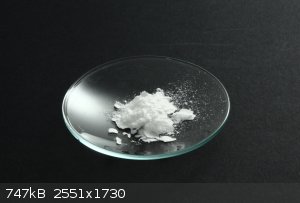 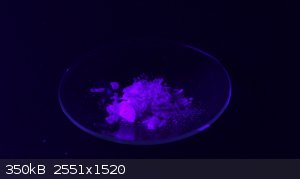
SOME CONSIDERATION ABOUT THE PRODUCT
I see this product considered hydrated, but I think it could also contain some coordination water.
If the product is gently heated it seems to lose some water but also some decomposition occurs.
I will try doing more experiments with it to substitute the water with other ligand without using too extreme experiment conditions.
[Edited on 21-2-2024 by ItalianChemist]
|